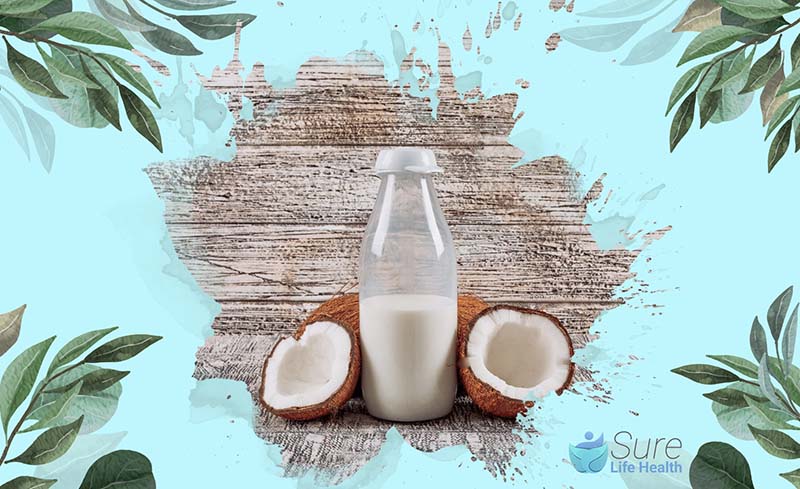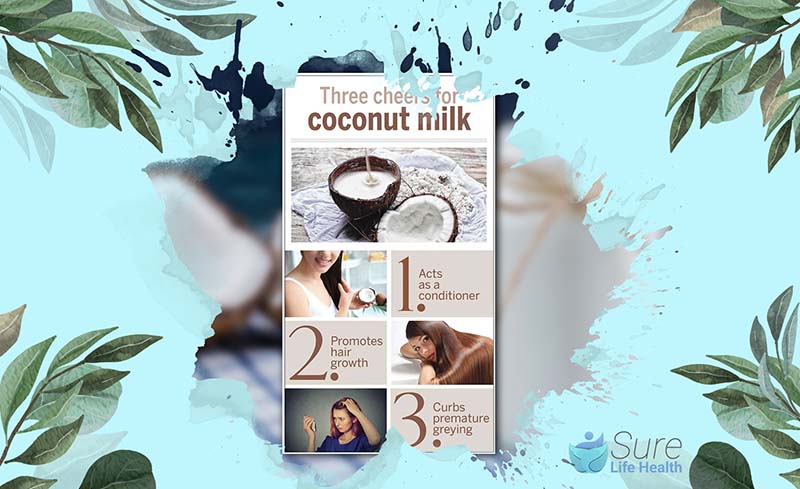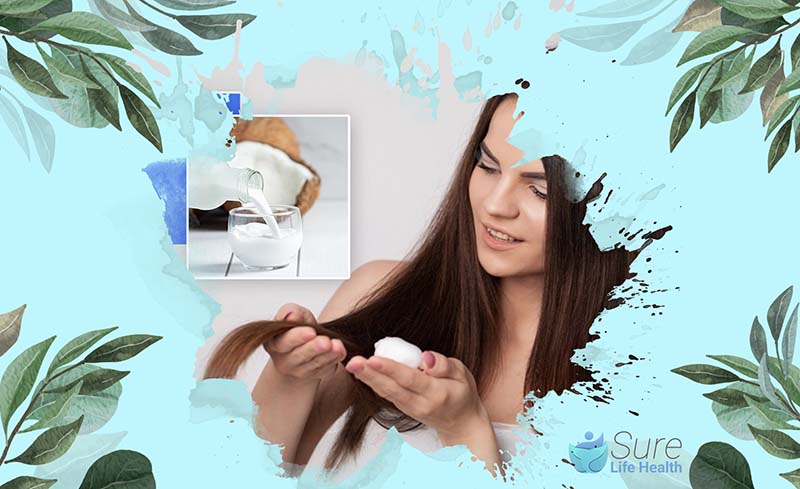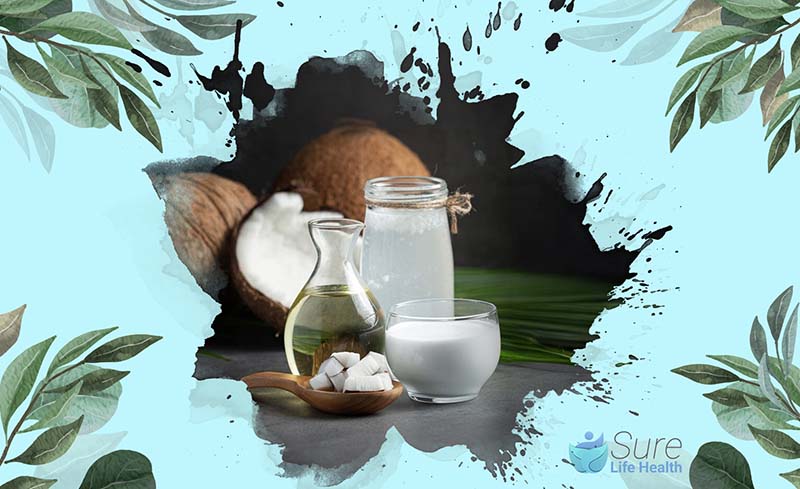Coconut oil has long been a favorite among health enthusiasts, and now another coconut product is earning recognition for its hair care benefits: coconut milk. This creamy substance is made by blending the grated white flesh of ripe coconuts with water, distinct from the clear coconut water that fills young coconuts.
Frequently used in beverages, soups, and various dishes, coconut milk is also proving to be valuable for hair care. Rich in nutrients due to the coconut oil present in the flesh, it helps to hydrate and strengthen hair. If you’re wondering, “Is coconut milk good for your hair?” the answer is yes. This makes coconut milk a noteworthy addition to hair care routines.
Is Coconut Milk Good for Your Hair?
Yes, coconut milk is great for your hair. It’s packed with medium chain fatty acids (MCFAs), such as lauric acid, which are similar to the natural fats found in human skin and hair. These fatty acids are wonderful for the scalp because they deliver essential oils, antioxidants, minerals, and amino acids. These nutrients help keep the scalp moisturized and shield it from damage.
Moreover, these fatty acids are good at cleaning out your hair follicles. They help prevent buildup at the roots of your hair and encourage your hair to grow. This makes coconut milk not just nourishing, but also a cleansing agent for your hair.

What Does Coconut Milk Do for Your Hair?
Coconut milk can be a fantastic addition to your hair care routine, with several reported benefits:
- Rich in Vitamins: Coconut milk is loaded with essential vitamins such as C, E, B-1, B-3, B-5, and B-6. These micronutrients are vital for overall health and support healthy, strong, and hydrated hair. Although the direct impact of these micronutrients on hair health is still under research, they hold potential benefits due to their antioxidant properties.
- High in Lauric Acid: Lauric acid, a prominent component of coconut, is a fatty acid known for its ability to deeply penetrate the hair and strengthen the cuticle. This can significantly enhance hair strength and resilience.
- High in Protein: Since hair is primarily composed of keratin—a type of protein—the high protein content in coconut milk can help maintain and strengthen your hair. Whether you drink it or apply it directly to your hair, coconut milk can provide these protein benefits.
- Restores Dry Hair and Scalp: The rich fatty acid content in coconut milk provides intense moisture, making it an effective conditioner that can revive dry hair and scalp.
- Slows Hair Loss: Lauric acid in coconut milk helps strengthen the hair cuticle, making it less prone to damage and breakage, which can reduce hair loss. However, more research is needed to confirm the effects of coconut milk specifically on hair loss rates.
- Gets Rid of Dandruff: The moisturizing and anti-inflammatory properties of coconut milk help improve scalp health, potentially reducing dandruff. Its effectiveness is enhanced when combined with other conventional ingredients found in dandruff shampoos, like pyrithione zinc.

Overall, coconut milk is not only nutritious but also beneficial for improving hair health, moisture, and growth. However, continued research is needed to fully understand its potential effects on hair loss and micronutrient impacts.
Using Coconut Milk Effectively for Hair
Using coconut milk to improve hair health is easier than you might expect. Here’s how you can maximize the benefits of this natural remedy:
Coconut Milk Mask for Hair Growth
Coconut milk isn’t just a culinary delight; it’s a powerhouse for your hair too. Packed with essential nutrients, it serves as an all-in-one solution to address various hair concerns.
How to Use Coconut Milk as a Hair Mask:
- Pour 1/4 cup of coconut milk into a bowl.
- Slightly heat the coconut milk
- Apply the warm coconut milk to your scalp. Massage gently for 10-15 minutes, ensuring even coverage.
- Don’t forget your hair tips! Apply the coconut milk to the ends to deeply condition them.
- Put on a shower cap to keep the coconut milk in place. Leave it on for 1 hour.
- Wash your hair with your regular shampoo. Enjoy the improved texture and shine!
Coconut Milk Hair Conditioner
Coconut milk isn’t just a delight for your senses; it’s also a great benefit for your hair. Its luxurious texture simplifies detangling, reducing hair breakage. Moreover, its soothing properties offer relief to those dealing with scalp issues like itchiness or flakiness.
How to Use Coconut Milk as a Hair Conditioner:
- After shampooing, remove excess water from your hair.
- Apply coconut milk, focusing on the driest parts: the mid-lengths and ends. Massage it into your scalp for added nourishment.
- Let the coconut milk sit for 3-5 minutes. For intense conditioning, leave it on for up to 10 minutes.
- Rinse thoroughly with cool water to seal in moisture and nutrients.
Coconut Milk and Aloe Vera Hair Treatment
Coconut milk and Aloe Vera make a dynamic duo when it comes to addressing hair concerns and promoting scalp health. While coconut milk moisturizes, Aloe Vera’s anti-inflammatory properties soothe the scalp and encourage hair growth.
What You’ll Need:
- 3 tablespoons of Coconut Milk
- 1 tablespoon of Aloe Vera gel
How to Combine Coconut Milk with Aloe Vera:
- Blend the Coconut milk and Aloe Vera gel in a mixing bowl until you achieve a smooth consistency.
- Apply the blend from your hair roots, gently massaging it onto the scalp and working it down to the tips.
- Allow the mixture to sit for 30 minutes, allowing your hair to absorb its nourishing properties.
- Rinse off with your regular shampoo and finish with a water rinse.
For optimal results, incorporate this mask into your routine twice a week.
Coconut Milk and Honey Hair Mask
Honey, renowned for its anti-inflammatory and antioxidant properties, is a potent ally against dandruff and scalp issues. When combined with Coconut milk, it not only nourishes hair roots but also enhances moisture retention, maximizing hair health.
What You’ll Need:
- 4 tablespoons of Coconut Milk
- 2 teaspoons of Honey
How to Combine Coconut Milk with Honey Hair Mask:
- Mix the Coconut milk and Honey thoroughly in a bowl until you achieve a uniform mixture.
- Massage the blend into your scalp, ensuring thorough coverage from roots to tips.
- Cover your hair with a shower cap to prevent drips and allow the mixture to work its magic for 1-2 hours, deeply penetrating the hair shaft.
- Wash your hair with a mild shampoo to remove the mask.
For optimal results, incorporate this mask into your hair care routine once a week.
Coconut Milk, Olive Oil, and Honey Hair Treatment
Treat your hair with a luxurious blend of coconut milk, olive oil, and honey. This combination of natural ingredients provides deep hydration, strength, and shine, leaving your hair looking and feeling its best.
What You’ll Need:
- 4 tablespoons of Coconut Milk
- 1 tablespoon of Olive Oil
- 1 tablespoon of Honey
- A shower cap
How to Combine Coconut Milk with Olive Oil and Honey:
- In a bowl, combine the Coconut milk, Olive oil, and Honey until well blended.
- Gently warm the mixture for approximately two minutes until it reaches a lukewarm temperature.
- Generously apply the mixture to your scalp, ensuring thorough coverage along the length of your hair.
- Use a shower cap to cover your hair, enhancing the treatment’s effectiveness by locking in moisture.
- Relax and allow the mixture to work its magic for an hour, nourishing your hair from root to tip.
- Rinse out the treatment using your regular shampoo and follow up with a conditioner for added softness.
Treat your hair to this rejuvenating blend once a week for optimal results, and revel in the beauty of deeply hydrated, strong, and radiant locks.

Duration for Leaving Coconut Milk in Your Hair
The duration for leaving coconut milk in your hair varies depending on the type of product used.
For coconut milk shampoos, adhere to the instructions on the bottle, typically rinsing out the shampoo after lathering.
Conditioners containing coconut oil should be left in your hair for a few minutes before rinsing during your shower. This brief period allows the conditioner to penetrate the hair effectively.
If you are applying a homemade hair mask with coconut milk, it should remain on your hair for approximately 15 to 20 minutes to maximize its benefits before rinsing it out.
Styling products with coconut milk are designed for extended use and can be left in your hair throughout the day or until your next wash, ensuring continuous nourishment and health benefits for your hair.
Coconut Milk Vs. Coconut Oil: Which Is Better?
When comparing coconut milk and coconut oil for hair care, each offers unique advantages.
Coconut milk is a powerhouse for hydration and conditioning. It’s loaded with essential nutrients that feed the scalp and encourage hair growth. Plus, it’s great for smoothing out tangles and reducing frizz.
On the flip side, coconut oil excels at penetrating the hair shaft, hydrating from within, and safeguarding hair proteins, which ultimately fortifies the strands. Additionally, it boasts antifungal and antibacterial properties, keeping the scalp in top shape. It can even double as a styling aid, forming a protective barrier against environmental aggressors and heat styling damage.
Combining both coconut milk and coconut oil can amplify their benefits. Together, they deeply moisturize, nourish, and shield the hair, resulting in hair that’s not only healthier but also easier to manage.

Softening Effects of Coconut Milk on Hair
Coconut milk enriches your hair with essential nutrients and oils, smoothing the hair cuticles so they lay flat. This imparts a radiant shine as your hair reflects light more brilliantly.
Additionally, smoother cuticles reduce tangles and enhance the softness of your hair. Rich in vitamins B, C, and E, coconut milk boosts the natural sheen of your hair and helps maintain its silky texture.

Potential Side Effects of Using Coconut Milk for Hair
Using coconut milk for hair generally comes with few documented side effects. However, it’s wise to perform a skin allergy test beforehand, especially if you’re unsure about your sensitivity to coconut milk. There’s a possibility of developing a skin rash, so it’s essential to ensure the test area shows no adverse reactions before applying the milk to your hair and scalp.
It’s important to note that due to its high fat content, coconut milk can have an oily texture. This might not be suitable if you already have an oily scalp and hair.

How to Make Coconut Milk Hair Mask
Making a coconut milk hair mask is an easy and effective method to nourish your hair. Start by making your own coconut milk and then boost its effects by adding oils like argan, almond, or jojoba.
Once your hair mask is ready, apply it generously to clean, damp hair. Use a wide-toothed comb to ensure it’s evenly distributed. Let the mask work its magic for up to 20 minutes, then rinse it out completely. For the best results, finish with your regular conditioner to seal in moisture and enhance softness.
Conclusion
In conclusion, the remarkable benefits of coconut milk for hair extend well beyond its culinary uses. This nutrient-packed natural ingredient offers deep conditioning properties and a pleasant scent that enhances the overall hair care experience. Regular use of coconut milk benefits for hair is evident as it effectively repairs damaged strands, reduces frizz, soothes the scalp, diminishes dandruff, and promotes healthier hair growth through improved scalp circulation.
To enjoy these benefits, easily incorporate coconut milk into your hair care routine. Mix a teaspoon with water and add it to your shampoo or create a deep treatment mask. For quicker results, apply it directly to your hair. With just a few uses, you’ll notice your hair becoming stronger and more radiant.
Don’t miss the opportunity to explore further insightful content from SurelifeHealth.
Professor Gaye Cunnane, PhD, MB, FRCPI
As the Director of Health and Wellbeing at RCPI, Professor Gaye Cunnane is at the helm of initiatives aimed at enhancing the health and well-being of RCPI Trainers and Trainees. Her role extends beyond administration; she is also a respected clinical professor of rheumatology and a consultant rheumatologist at Trinity College Dublin (TCD) and St James’s Hospital. Prof. Cunnane’s medical journey began at TCD, where she graduated from medical school, and her path has been marked by both clinical and academic excellence.
After completing her basic clinical training in medicine, she embarked on PhD studies at University College Dublin and St Vincent’s University Hospital. Her research during this period was focused on prognostic markers in early inflammatory arthritis, a project that saw her collaborating with esteemed universities across Europe, including in Switzerland, The Netherlands, the UK, and Sweden.
Prof. Cunnane’s career took her to the University of California, San Francisco, where she spent three years delving into research on new treatments for lupus. Her academic prowess led her to the University of Leeds in 2001 as a senior lecturer, before returning to Ireland in 2003 to assume her current roles. She has also served as the National Specialty Director for Rheumatology training in Ireland, Programme Director for Basic Specialist Training with RCPI, and as a past President of the Irish Society for Rheumatology.
PUBLISHED ARTICLES
“Rheumatic disease differentiation using immunoglobulin G sugar printing by high-density electrophoresis”: Published in The Journal of Rheumatology, this study reflects her in-depth investigation into rheumatic diseases.
“Benefits of exercise in patients with rheumatoid arthritis: a randomized controlled trial”: This research work, highlighting the positive impact of exercise on rheumatoid arthritis, underscores Prof. Cunnane’s dedication to practical, patient-centered research.
Additionally, Prof. Cunnane has made notable contributions to the Annals of the Rheumatic Diseases, discussing early referral, diagnosis, and treatment of rheumatoid arthritis. She has also been involved in a study on the NCBI platform investigating exercise benefits in rheumatoid arthritis patients.
Professor Gaye Cunnane’s career is a testament to her commitment to improving patient outcomes in rheumatology through rigorous research, clinical excellence, and dedicated teaching. Her work continues to influence the field of rheumatology, both in Ireland and internationally.

